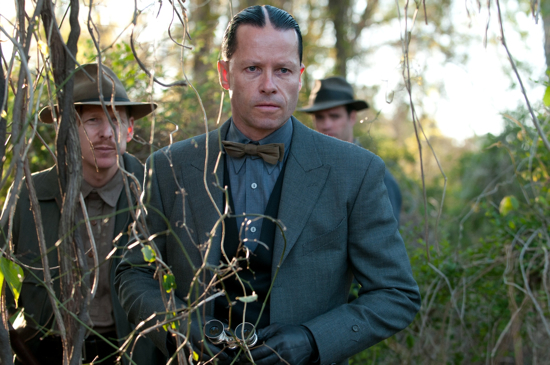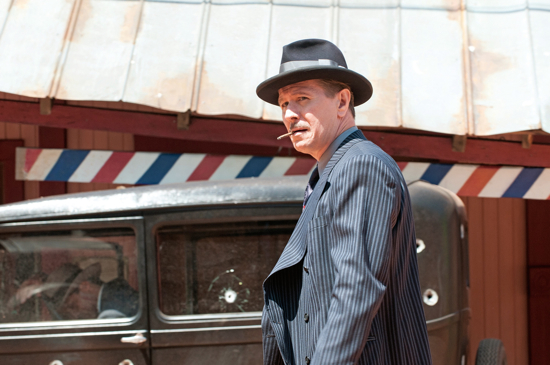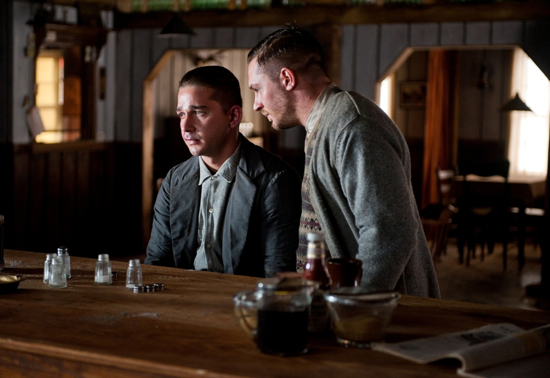Somewhere near the beginning of John Hillcoat and Nick Cave’s latest collaboration, before the kind of sly, knuckledustered punch that flies through much of this brutal picture, one character tells a stick-up man that the world is changing, that life is silently coming for him and his way – he just doesn’t know it yet. The bandit stands baffled, looking around to his gang of cigar-puffing hoodlums, before receiving said fist in the eyeball. The irony is that the man throwing the punch, Forrest Bondurant (Tom Hardy), is about to have his life changed by forces beyond his normally tight control. It’s a theme that’s introduced early and effectively, recurring throughout, and one of the gangster genre in general – of this raging against change, the slow decay settling in, by way of greed, violence and corruption.
The year is 1931 and Prohibition is in full swing. The Bondurant brothers, Forrest, Jack (Shia LeBeouf) and Howard (Jason Clarke), are bootleggers supplying the cities and locals alike with their brand of country moonshine. They have it easy for now but the times, as they say, are a-changin’. In the aftermath of an East Coast crime wave, the likes of which the country has never seen, the police are cracking down and flowing out to Franklin County, Virginia: home of the Bondurants, and the so-called "wettest county in the world", as named by Sherwood Anderson for its plethora of bootlegging outfits.
In the background, Floyd Banner (Gary Oldman) runs a bigger operation, in and around the cities, and has a public persona that Jack is enamoured with. Like the gangsters of today, the attainment of big guns and big money – and the notoriety that goes with it – is the youngster’s ambition. This is made clear enough when Jack sees Banner ride through town in hot pursuit, before Oldman (looking as smooth-faced as something out of a CGI-cut scene) jumps out and coolly lights up his enemy’s car with a Tommy gun. Jack runs to tell his buddy Cricket (Dane DeHaan) what he’s seen. Banner "has direction" and "ambition", he says, and the audience is clobbered into submission by the character’s motivation. Soon, though, our villain arrives to challenge Jack’s aspirations. There’s a new special deputy in town, yessir, Charlie Rakes (Guy Pearce), and he demands his cut for protection. Of course, testosterone has a reputation to defend, and the Bondurants begin a blood feud that becomes the stuff of legend.
With the helping hand of Jack’s narration, we’re introduced to this other world, one fleshed out and dressed up with staggering authenticity. Not once throughout the production does there seem an out of place prop, costume, or word (save for, perhaps, one gangstered-up "motherfucker"). But the wardrobe doesn’t really save a cast that, with the exception of the two female leads, falters with the script’s episodic monotony. Mia Wasikowska is convincing as the preacher’s daughter, Bertha, who gets involved with Jack. Jessica Chastain, as the former showgirl turned barmaid, Maggie, also appears effortless.
The problem is that there is a little too much hard acting by the rest of the cast. LaBeouf is either always smirking or blubbering, Hardy grunting, Clarke nothing. Their foe Pearce titters as the dandy villain – a kind of cartoon John Waters, sans moustache – as they all face off, each man doing his best to appear brooding at alternate intervals. There’s this visible strain to be memorable, with only some of that menace seeping through in a tale that is largely forgettable, save for the explosions of often sadistic violence that are hard to shake, scored by some over-conspicuous numbers on the soundtrack.

At least the script is an ambitious one. It attempts to relate a number of threads simultaneously, which results in a more cosmetic treatment of an intriguing chapter of American history. Rumours of a four-hour cut leave one to imagine what might have been. That it so boldly waves its ‘based on a true story’ banner is also interesting. What we witness is sometimes so outrageous, and in many cases downright improbable, that we begin to wonder how much liberty has been taken with the source material – The Wettest County In The World by Matt Bondurant, grandson of Jack – a book which itself acknowledges a tendency towards folklore.
What does work, however, is that Lawless doesn’t take itself too seriously, running smooth with a knowing nod to some of its more outlandish mythmaking. Not that it’s ‘light’, in any sense of the word. Some of the more violent moments had audience members at the preview screening I attended yelping in agony: the mark of savagery that a Hillcoat film has come to demand, though which he rarely celebrates. The hits are ugly, fast, and devastating. Everything gets worse a lot faster when the violence starts, but that man is so quick to the punch is a rule that Hillcoat and Cave observe, with Benoît Delhomme’s cinematography giving tangible richness to this autumnal land of midnight smoke and moonshine.

Unusually, there seems to be no blurred line between good and bad – those throwing the punches, and those receiving them – as in Hillcoat’s other features, most notably 2005’s The Proposition (also penned by Cave) and The Road (2009). Everything in the world of Lawless seems too clearly defined in this respect, meaning we don’t glimpse the depth of the Australian director’s previous offerings. It rolls up more as a straightforward gangster flick that just happens to be set in pastoral surroundings, with an anticlimactic set piece to boot, a final showdown that doesn’t satisfy any of the story’s built-up tension.
Any commentary on the United States’ current, erroneous War on Drugs doesn’t really come into it. The closest we get is Jack’s obsession with gangster glam, which could be interpreted as a comment on the movie itself, since the brutality portrayed is unbearably ugly, and not the same brand of popcorn shoot-’em-up usually glossed onto summer billboards. It all seems a lot more real the way Hillcoat refuses to sugarcoat the destructiveness of violence. Other than that, the bootleggers are merely supplying a demand, for a product that, in this created world, should be readily available to anyone who wants it. Viewers coming to this expecting a drama that meets David Simon at ten paces will find little to chew on. But as a film about the desire for immortality through legend, invincibility through folklore, and men in times of flux contending with their own myths as they live them, it certainly has its moments.



